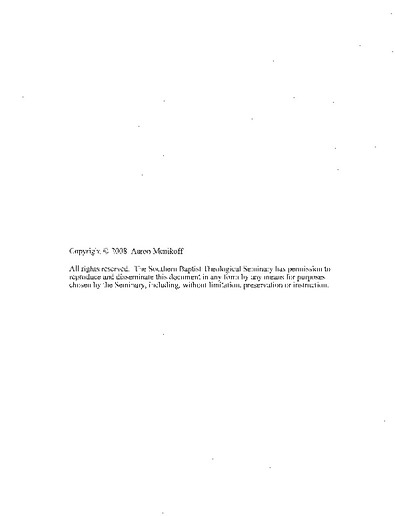| dc.contributor.advisor | Wills, Gregory A. | |
| dc.contributor.author | Menikoff, Aaron | |
| dc.date.accessioned | 2010-01-08T16:36:27Z | |
| dc.date.available | 2010-01-08T16:36:27Z | |
| dc.date.created | 2008-03-03 | |
| dc.date.issued | 2008-03-03 | |
| dc.identifier.other | THESES Ph.D. ..M526p | |
| dc.identifier.uri | http://hdl.handle.net/10392/482 | |
| dc.description.abstract | This dissertation examines the relationship between Baptists and social reform from 1770 through 1860. Chapter one examines two explanations to the social movements of this period. Attention is given to the tension between personal piety and social activism inherent in Baptist life.
Chapter two explores the most controversial social issue of the nineteenth century: slavery. By weighing in on the colonization scheme, religious instruction, and abolition.
Chapter three examines one of the most significant but least known debates of the antebellum period: the effort to end Sabbath mail delivery. Baptists pressed for a legislative end to a social problem. Not all Baptists shared the conviction that Congress should interfere.
The subject of chapter four is the evangelical crusade against poverty. Baptists spiritualized the effort. Fighting poverty meant encouraging conversion and promoting virtue.
Chapter five presents the temperance crusade as a spiritual and political mission. Temperance tested Baptist convictions more than any other philanthropic movement. The tension between the sacred and the secular came to the fore as Baptists disagreed over the role of benevolent societies.
Chapter six examines the role of piety in Baptist life. It argues that far from forcing Baptists to withdraw from society and culture, their view of personal piety drove them into society. It was forged by their understanding of and desire for religious liberty. From very early on, they came to believe that society's best hope was a Christian and a church committed to the gospel. Even when Baptists articulated the spiritual nature of the church, they did so with the understanding that a spiritual church is a blessing to society.
Chapter seven considers the impetus for direct political engagement discussed by Baptists. Always rejecting party politics, Baptists knew they had a responsibility to engage the public sphere. Pastors looked for "the medium path" that embraced every topic worthy of sermonizing without degrading their ministry.
Chapter eight summarizes the argument. Baptists were social reformers. | en_US |
| dc.language.iso | en_US | en_US |
| dc.subject | Baptists--United States--History--19th century | en_US |
| dc.subject | Social service--Religious aspects--Baptists | en_US |
| dc.subject | Christianity and politics--Baptists | en_US |
| dc.subject | Evangelicalism--United States--History--19th century | en_US |
| dc.subject | Social reformers--United States--History--19th century | en_US |
| dc.subject | United States--Church history--19th century | en_US |
| dc.title | Piety and politics: Baptist social reform in America, 1770-1860 | en_US |
| dc.type | Thesis | en_US |
| dc.publisher.institution | Southern Baptist Theological Seminary | en_US |

